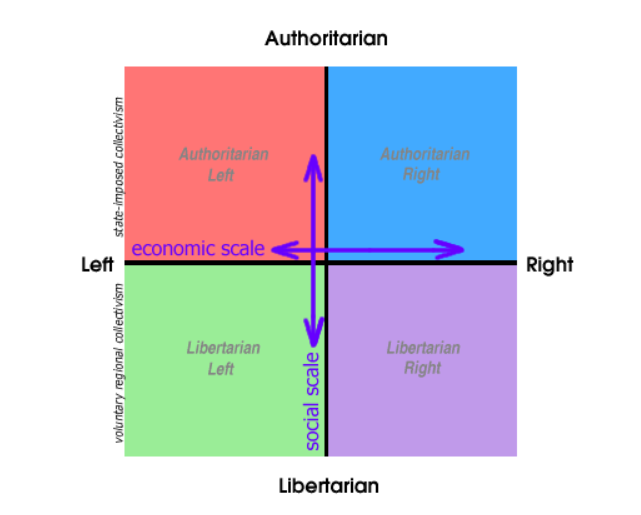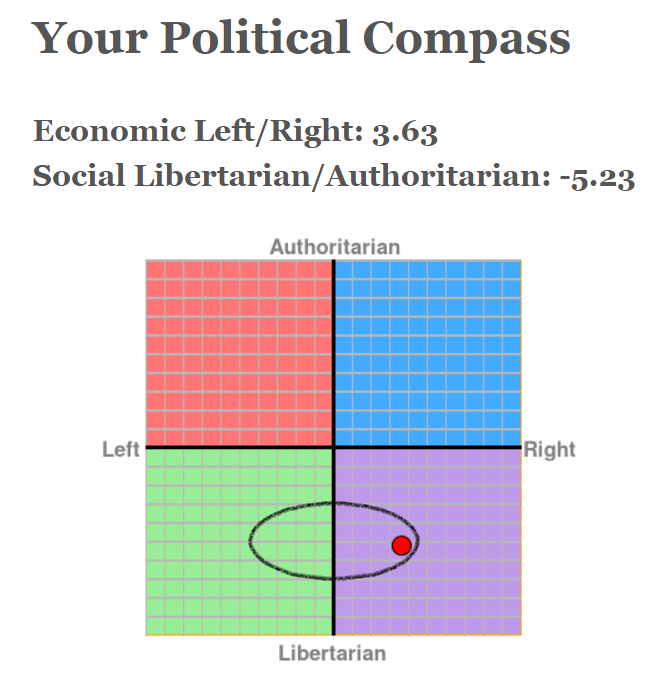Part 1 – Political Identity
Happy New Year to those of you who celebrate. And to those of you for whom Ruth Bader Ginsburg was a personal hero, may her memory continue to be an inspiration to you.
I normally wait until the last minute to write my election posts, but we live in interesting times. Given the fact that some Americans are already casting ballots, it seemed like a good time to start examining issues that will be impacted by our decisions over the coming six weeks.
As I frequently point out, this blog is intended to be more a source of information than opinions, but this post is uncharacteristically opinionated for the simple reason that I often determine my positions through researching and writing on a given topic and then discussing that topic with others. I occasionally find it useful state my position to help illuminate a point, but that should not be taken as my attempt to sway the reader, rather as an invitation of joint exploration.
Political Spectrum
I believe I was in college the first time I was told that the political spectrum was not a one-dimentional line, but a two-dimentional grid, in which the x-axis was economic issues and the y-axis was social issues / government authority. This new concept made much more sense to me because I often had conflicting thoughts about whether I was a Democrat or Republican. I like to joke that I was raised in a house where “Democrat” was a bad word, and while I agreed with some core tenents of conservatism, I also knew I had some progressive opinions about social issues that would most certainly label me a liberal.
The beauty of this grid was that I could have conservative economic views and liberal social views, and there was a place for me, without being in the middle of a tug of war between two parties, neither of which I felt represented me. I also learned that there was a party that better represented my beliefs about small government, individual freedoms, responsible behavior, and looking out for each other. The College Republicans at my small, liberal arts college was certainly in the single digits as far as members, and most of us were not even Republicans, but Libertarians.

Image credit: The Political Compass [1]
Gearing up for my first-ever election in 2004, I proudly slapped a Michael Badnarik bumper sticker on my dorm room door and wrote an op-ed for the school paper about the benefits of voting for a candidate who truly represented your interests. I reveled in this expanded worldview and no longer settling for the lesser of two evils. And then… I was ultimately cowed into voting for Bush, as we were facing the “most crucal election ever.” Little did I know that I would hear that phrase again… Every. Four. Years.
While doing the research for this post, I revisited the Political Compass website.[2] I’ve taken their quiz several times over the years and usually wind up around the same area of the chart: firmly in the bottom half and always near the center, with slight shifts left or right depending on what’s going on in my life at the time. In revisiting their work, I looked into the organization and was surprised to see that it was a lot more established, comprehensive, and wide-reaching than I had imagined, with resources related to elections in several major countries throughout the world, such as the US and Canada, Australia and New Zealand, the UK, and several members of the EU.
In full disclosure, the creators of the Political Compass do not say much about themselves, though it appears to be an effort independent of their primary jobs. There are some critics who raise concerns about the lack of transparency related to their operations and their algorithms, but I also understand their need to protect their intellectual property. “The Political Compass” trademark belongs to New Zealand company Pace News Limited, which was once connected to One World Action, a former London-based charity focused on eliminating poverty and oppression.[3] Most of their funding comes through image licensing, sponsorships, seminars, and donations.[4]
Political Plotting
As for me, I was likely my farthest left in high school when I was young and idealistic, believing that we could all take care of each other. I was likely my farthest right in grad school, slightly older and still idealistic, getting my MBA and believing that our economy is based on a level playing field. After five-plus years in non-profit work that supports disadvantaged communities, I find myself moving left toward the center again, and that doesn’t surprise me. Ultimately I believe that a position held for a lifetime is likely a position that has gone unexamined – and as I gain different life experiences, my perspective tends to shift accordingly.

Image credit: The Political Compass [5]
The more subtle shift is on my y-axis (social) beliefs, which have moved almost imperceptibly upward toward center. While I am still firmly Libertarian in a “do your own thing as long as you’re not hurting anyone else” sense, and while I am still thoroughly terrified by the thought of authoritarian governments, I can appreciate the value of a moderate but coordinated, centralized approach in certain situations. This added perspective is most likely as a result of more recent experiences, such as…
- the work I’ve done in the nonprofit world: seeing the benefit that a minimal safety net could provide for vulnerable populations,
- the research and writing I do for this blog: knowing not everyone has the time to do sufficient research to make educated decisions,
- and in simply watching the news in 2020: seeing that there aren’t sufficient measures in place to respond to global pandemics or climate change
But I remain aware that saying “I know best” is a dangerous assumption that could leave out important and unconsidered perspectives. Further, putting that control in the hands of the government means that when parties change and have different positions, they may change their approach to something with which you don’t agree – and will be reluctant to relinquish the power previously granted them. (This is why I’m always going on about consistent, active participation in your local races!)
My own position on the graph was not surprising to me. What was surprising was where some of our politicians landed. Though I was familiar with the Political Compass’ quiz, I had never seen their plots of political candidates before. The group uses voting records, manifestos, and actions to plot individuals on their chart. They include international figures across the 20th century (e.g. Stalin, Churchill, Ghandi, … Ayn Rand), as well as recent sets of candidates by country, by election. Through all of this, they keep their standard constant, so viewers can make an apples-to-apples comparison.

Image credits: The Political Compass [6], [7], [8], [9], [10]
Political Shifts
I went back and looked at the charts for every presidential election in which I have cast a vote. The Republicans, Libertarians, and Greens were all about where I would have expected them to be, but the Democrats were not. For as much political rhetoric we hear about the divide between left and right, I was shocked to see how closely they sit on the chart. Furthermore, I couldn’t believe that all of the Democratic nominees for president since The Political Compass started up have been right of center, or that all of the Democratic nominees since 2012 are farther right than I ever was as a card-carrying, Romney-voting Republican.
Since the 1980s, there has been a shift right across the board in the US and other leading economies. This right-shift of the Democratic party can be attributed to Neoliberalism, a modified form of liberalism tending to favor free-market capitalism. Examples include the UK under Thatcher and every presidential administration in the US since Reagan (Democrats and Republicans).[11] The concurrent shift up the y-axis toward authoritarianism can be explained through the increased regulation desired in the application of neoliberal ideals, also through additional curbs on civil liberties as a result of increased immigration and/or terrorism threats.[12]
In any case, it is important to note the scale of these differences when you are doing your research. I speak from experience that being told it is “the most crucial election of our lives” is an appeal to your emotions. Look at the facts – objective facts – before deciding. Perform your own research using factual, centrist sources – the Media Bias Chart can help you find one.[13] Map yourself on the Political Compass and see which candidate actually best represents your interests – it might surprise you.
My annual election spreadsheet is below. Hopefully it will be a good place for you to start or supplement your own research.
NB: the scores and positions in this spreadsheet are from VoteMatch,[14] which is limited to the scale of American politics, not the global scale shown in The Political Compass.
~
Where do you fall on the Political Compass? Were you surprised by your result? I’d love to hear your thoughts below.
Thanks for reading!
[1] https://www.politicalcompass.org/images/bothaxes.gif
[2] https://www.politicalcompass.org/
[3] https://en.wikipedia.org/wiki/One_World_Action
[4] https://www.politicalcompass.org/donate
[5] https://www.politicalcompass.org/test
[6] https://www.politicalcompass.org/uselection2004
[7] https://www.politicalcompass.org/uselection2008
[8] https://www.politicalcompass.org/uselection2012
[9] https://www.politicalcompass.org/uselection2016
[10] https://www.politicalcompass.org/uselection2020
[11] https://simple.wikipedia.org/wiki/Neoliberalism
[12] https://www.politicalcompass.org/faq#faq23
[13] https://www.adfontesmedia.com/
[14] https://votematch.ontheissues.org/
0 Comments